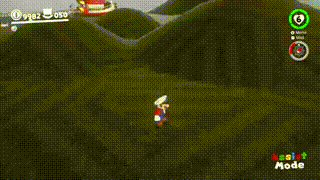Backflip: Difference between revisions
m little grammar change |
transferred worst quality gif you've ever seen from the old wiki |
||
| (3 intermediate revisions by 3 users not shown) | |||
| Line 1: | Line 1: | ||
[[File:Backflip.gif|thumb|330x330px]] | |||
A '''backflip''' is a type of jump that can be executed quickly and gains a decent amount of height. A backflip is performed by jumping while crouching in a stationary position (if the crouch and jump inputs are entered while moving, Mario will perform a [[long jump]] instead). | A '''backflip''' is a type of jump that can be executed quickly and gains a decent amount of height. A backflip is performed by jumping while crouching in a stationary position (if the crouch and jump inputs are entered while moving, Mario will perform a [[long jump]] instead). | ||
Latest revision as of 11:23, 14 February 2023

A backflip is a type of jump that can be executed quickly and gains a decent amount of height. A backflip is performed by jumping while crouching in a stationary position (if the crouch and jump inputs are entered while moving, Mario will perform a long jump instead).
Properties
Backflips have a height of 496 units[1], thus making them identical in height to both sideflips and vaults. Backflips have a fixed height, meaning this figure is not affected by how long the jump button is held during the jump. During a backflip, Mario will also move backward slightly, making them useful in situations where Mario needs to clear an overhang or gain distance away from a wall during his jump. Backflips do not have a fixed horizontal distance, meaning if the player holds the joystick in a direction it will affect how much horizontal distance is gained by the backflip.
Because sideflips also move Mario laterally a similar amount, backflips and sideflips are often interchangeable in certain scenarios. However, backflips are generally more suited to situations where Mario must initiate a jump from a standstill, while sideflips are better suited to when Mario was already moving prior to the jump.
